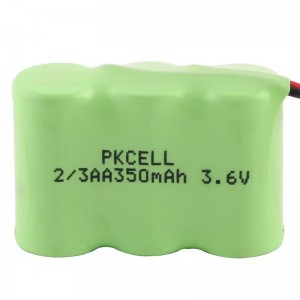NiMH is an abbreviation for nickel-metal hydride.
NiMH batteries are the most common rechargeable batteries we find in consumer electronics. Due to its superior chemical properties, NiMH batteries have replaced NiCd battery applications. Since NiMH does not use cadmium (a toxic chemical used in battery applications) and additionally does not have the same memory issues that plague NiCDs, NiMH is a better choice. Meanwhile, portable high-power solutions are one of the most popular solutions for battery applications. Let's take a look at the tips for using NiMH batteries!
What are the classifications of NiMH batteries?
We typically see NiMH battery packs consisting of multiple individual cells connected in series. Compared with lithium polymer batteries (LiPO), NiMH batteries are safer to use. Each individual cell is rated at 1.2V, which means we see NiMH packs rated at multiples of 1.2V. In particular, we offer 1.2, 2.4, 3.6, 4.8, 6.0, 7.2 and 8.4 volt battery packs.
Regardless of the physical size of the battery, each NiMH battery is rated at 1.2V. The physical size of the battery indicates the capacity of the battery. Generally, the larger the battery, the greater the mAh of the battery.
See the table below for a quick reference of this relationship:


What are the fields of application of Ni-MH batteries? Why?
As mentioned above, NiMH batteries are great for short-term (<30 days) high water consumption. Some of the consumer applications where we see NiMH batteries used are digital cameras, communication equipment, personal cosmetic equipment, and notebook batteries, among others.
How to use Ni-MH batteries is the best?
NiMH batteries can have some drawbacks, mainly that they discharge themselves. When the battery is not in use, it will slowly drain its charge, and if there is enough time left on the battery, the battery may be permanently damaged. A rough estimate of the drain on a NiMH battery is that 20% of the battery's capacity will be drained within the first 24 hours of charging, and an additional 10% every 30 days thereafter.
How to charge NiMH batteries?
To charge NiMH batteries we need a specific charger as using an incorrect battery charging method can render the battery unusable. Please note that you only need to charge the Ni-MH battery for less than 20 hours, because charging for a long time may damage the battery!
How many times should NiMH batteries be charged?
Typically, expect 2,000 charge/discharge cycles for a standard NiMH battery, but mileage may vary. This is because every battery is different. The usage of the battery can also determine the number of cycles the battery will survive. All in all, 2000 (or so) cycles for a battery is pretty impressive for a rechargeable battery!
Precautions for charging Ni-MH batteries?
To preserve the life of your battery, there are a few things you should keep in mind:
Trickle charging is the safest way you can charge your battery. To do this, make sure to charge at the lowest possible rate, with a total charge time below 20 hours, and remove the battery at this point. This method basically charges the battery at a rate that doesn't overcharge the battery, but keeps it charged.
Do not overcharge NiMH batteries. In short, charging stops once the battery is fully charged. There are several ways to know when the battery is fully charged, and the battery chargers on the market today are all "smart" that can help detect small changes in the voltage/temperature of the battery and can indicate a fully charged battery.
Storage problem of NiMH batteries?
Initially, there were widespread problems with nickel-based batteries and memories. Basically, if you don't fully drain the battery before recharging, it will slowly lose its capacity over time. However, today's NiMH batteries don't have these problems, but you can still see the same effect if you don't fully discharge them. Newer NiMH can be restored by "exercising" the battery (fully charging and discharging the battery a few times).
Can NiMH batteries replace alkaline batteries?
This is perfectly fine! If you're using alkaline batteries, it's possible to pick up some NiMH batteries to replace them. The voltage drop experienced by alkaline batteries while in use cancels out the voltage difference (Alkaline 1.5v, NiMH 1.2V).
Every battery is a little different, as is the quality of the batteries. Always check the battery data sheet/product information before charging for the first time!
We are participating in the TDC exhibition in Hong Kong, if you have any questions, you can also contact us at the scene
Pkcell waiting for you at HKTDC Booth No.: 5C-D14
Post time: Apr-13-2023



